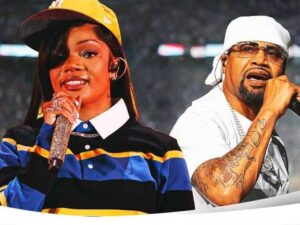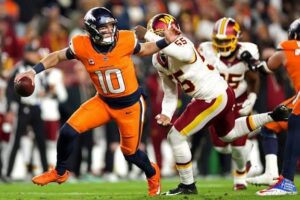The Untold Story: Why Michael Jordan Retired as a Wizard — Not a Bull
The Untold Story: Why Michael Jordan Retired as a Wizard — Not a Bull
His Final Comeback Wasn’t About Basketball. It Was About Something Much Bigger.
By Daniel Phillips
May 19, 2025
WASHINGTON, D.C. — June 14, 1998. The moment is etched into the soul of every basketball fan.
The Chicago Bulls. The Utah Jazz. Game 6 of the NBA Finals. The Delta Center shook with anticipation. With just 6.6 seconds left on the clock, Michael Jordan sizes up Bryon Russell, crosses over to his left, and releases a smooth, fading jumper that finds the bottom of the net.
The shot was iconic. A perfect punctuation mark.
6 championships. 6 Finals appearances. 6 wins. Zero losses.
A walk-off that would define sports greatness for generations.
Jordan left the floor with his finger raised — not for show, but as a symbol: one last reminder of who reigned supreme.
He retired that summer for the second time. And for many, that was supposed to be the end.
But then came the shock.
In 2001, Michael Jordan came back.
Not in Chicago red.
But in Washington Wizards blue and gold.
To some, it made no sense. Why would the greatest player of all time — the man who had already cemented an unblemished legacy — return to the hardwood wearing a different jersey?
Why risk perfection?
The real answer is far more profound than stats or glory.
From Player to President
After retiring from the Bulls in 1999, Jordan transitioned into an executive role, becoming the President of Basketball Operations for the Washington Wizards. The team was struggling. Attendance was low, morale was worse, and the front office was directionless. The Wizards needed a spark. A vision. A savior.
Jordan, ever the competitor, stepped up—not to play, but to rebuild.
He got to work reshaping the roster, drafting high school phenom Kwame Brown in 2001, and pushing for a new culture of accountability. But from the sidelines, something began to eat at him.
The game still called to him.
But this time, the reason to answer wasn’t fame or ego.
It was something far deeper.
The Day That Changed Everything
On September 11, 2001, America was shaken to its core. The attacks on the World Trade Center and Pentagon sent shockwaves throughout the country. It was a moment of unspeakable grief, confusion, and vulnerability.
Like so many Americans, Jordan was devastated. But he also felt called to act.
In a private conversation with close friends and team executives, Jordan made a decision few expected:
He would return to the NBA — not for personal glory, but to help his country heal.
A Comeback with a Cause
On September 25, 2001, Michael Jordan announced he was returning to the NBA — as a player for the Washington Wizards. He was 38 years old. His knees weren’t what they used to be. He hadn’t played professionally in nearly three years.
Yet none of that stopped him.
What the public didn’t fully know at the time was this:
Jordan pledged to donate his entire Wizards salary — every cent — to the victims and families affected by 9/11.
Approximately $1 million per season went directly to relief efforts and charitable organizations. It was never publicized widely. He never sought a spotlight for the gesture. It was done quietly, from the heart.
“It wasn’t about the game anymore,” one Wizards executive recalled. “It was about healing. About hope. Michael came back because he believed basketball could still inspire.”
Defying Time, Defining Character
Jordan’s return wasn’t ceremonial. It wasn’t a farewell tour. It was war.
In his two seasons with the Wizards, he played 142 games, averaging over 20 points per game and logging close to 40 minutes a night at times. He battled through injuries, criticism, and grueling expectations.
The team didn’t make the playoffs, but that wasn’t the point.
His presence revitalized the franchise.
Attendance soared.
Merchandise sales boomed.
TV ratings surged.
Suddenly, Washington basketball mattered again.
More importantly, MJ’s return gave the nation something familiar to root for in an unfamiliar world. In the months following 9/11, when Americans needed unity and strength, Jordan laced up his sneakers to give us exactly that.
Legacy: Beyond Rings
Critics have long debated the merits of Jordan’s Wizards chapter.
Some say it tainted his legacy. That he should’ve stayed retired after “The Last Shot.”
But those who truly understand the man behind the legend know:
The Washington years were not a blemish — they were a revelation.
Because greatness isn’t just about championships and highlights.
Greatness is about courage. Sacrifice. Vision. Integrity.
Michael Jordan didn’t return to chase a seventh ring.
He returned to serve.
To give.
To lead when leadership was most needed.
The GOAT in Spirit
Today, that chapter in Jordan’s story is too often overlooked — a footnote in an otherwise spotless career.
But to many in Washington, and to countless families impacted by his quiet generosity, it was everything.
“He didn’t need to come back,” said one 9/11 widow who received support through MJ’s donations. “But he did. And he gave us more than basketball. He gave us hope.”
So yes, Jordan retired as a Wizard — not a Bull.
Not because he had to.
But because he chose to.
That choice may not have added to his ring count.
But it added something far greater to his legacy:
Humanity.
And that, more than any stat or trophy, is why Michael Jordan remains not just the greatest of all time on the court —
But the greatest of all time, period.






